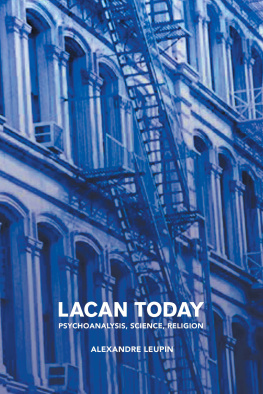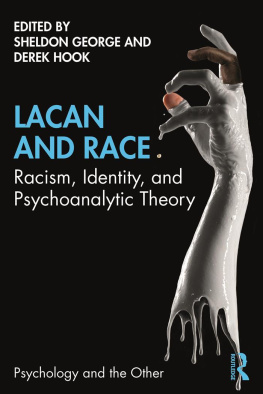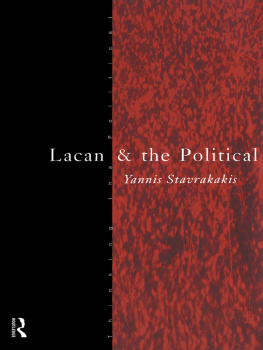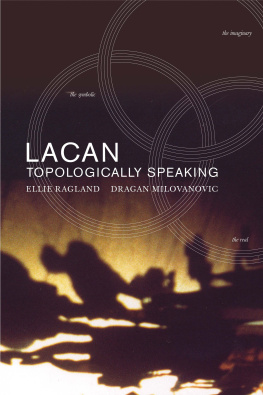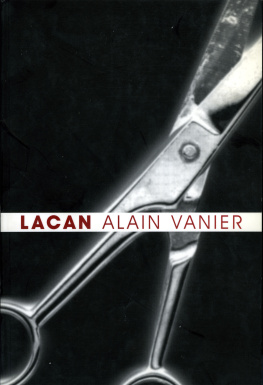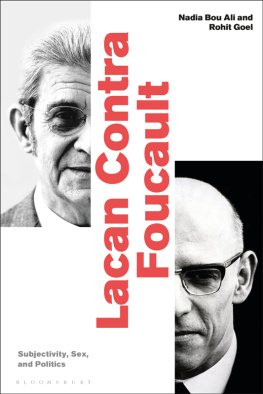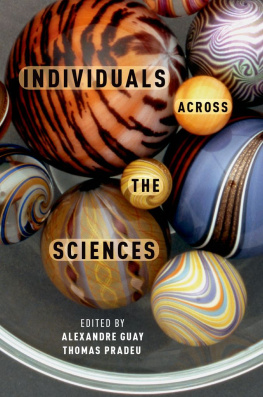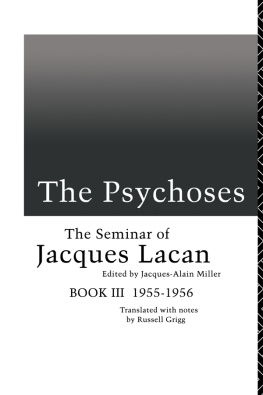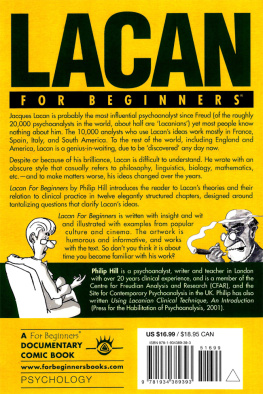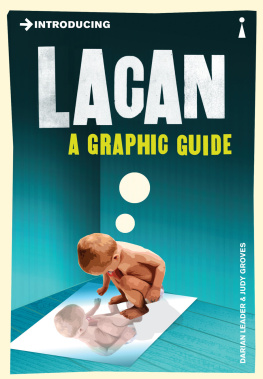Alexandre Leupin - Lacan Today
Here you can read online Alexandre Leupin - Lacan Today full text of the book (entire story) in english for free. Download pdf and epub, get meaning, cover and reviews about this ebook. year: 2020, publisher: Other Press, genre: Romance novel. Description of the work, (preface) as well as reviews are available. Best literature library LitArk.com created for fans of good reading and offers a wide selection of genres:
Romance novel
Science fiction
Adventure
Detective
Science
History
Home and family
Prose
Art
Politics
Computer
Non-fiction
Religion
Business
Children
Humor
Choose a favorite category and find really read worthwhile books. Enjoy immersion in the world of imagination, feel the emotions of the characters or learn something new for yourself, make an fascinating discovery.
- Book:Lacan Today
- Author:
- Publisher:Other Press
- Genre:
- Year:2020
- Rating:3 / 5
- Favourites:Add to favourites
- Your mark:
- 60
- 1
- 2
- 3
- 4
- 5
Lacan Today: summary, description and annotation
We offer to read an annotation, description, summary or preface (depends on what the author of the book "Lacan Today" wrote himself). If you haven't found the necessary information about the book — write in the comments, we will try to find it.
Lacan Today — read online for free the complete book (whole text) full work
Below is the text of the book, divided by pages. System saving the place of the last page read, allows you to conveniently read the book "Lacan Today" online for free, without having to search again every time where you left off. Put a bookmark, and you can go to the page where you finished reading at any time.
Font size:
Interval:
Bookmark:
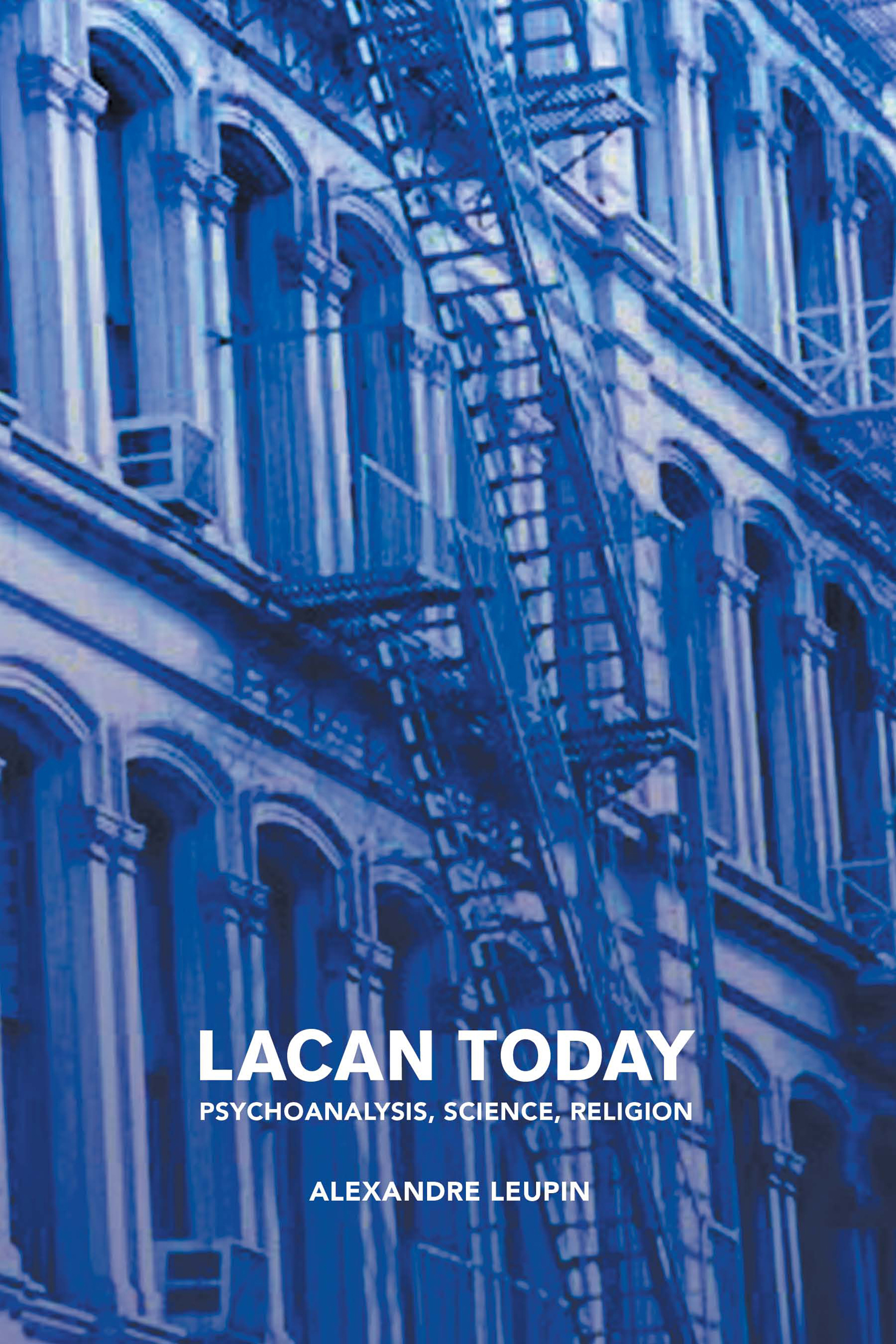
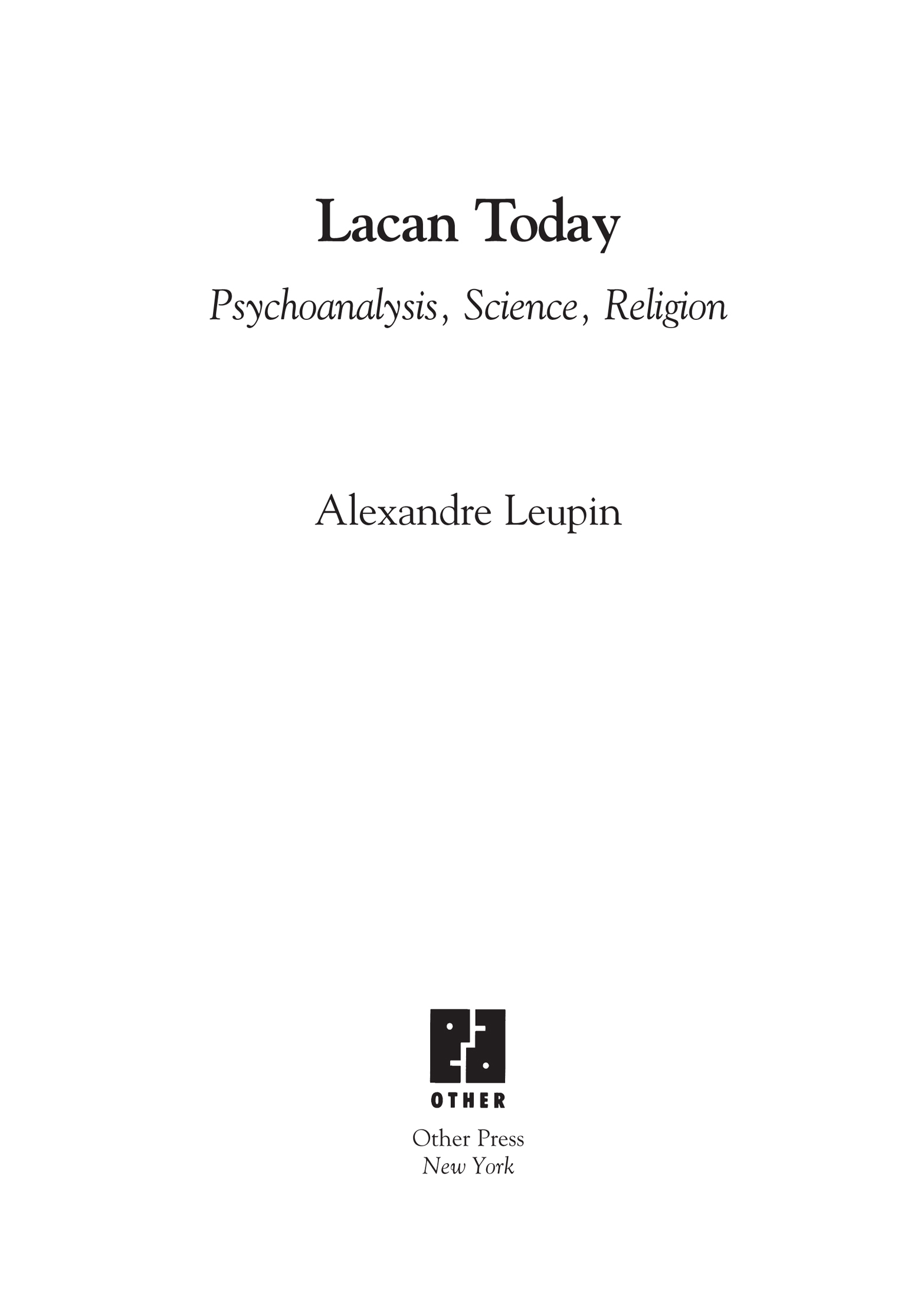
Copyright 2004 Alexandre Leupin
Production Editor: Robert D. Hack
Ebook ISBN9781635421095
All rights reserved. No part of this publication may be reproduced or transmitted in any form or by any means, electronic or mechanical, including photocopying, recording, or by any information storage and retrieval system, without written permission from Other Press LLC, except in the case of brief quotations in reviews for inclusion in a magazine, newspaper, or broadcast. For information write to Other Press LLC, 267 Fifth Avenue, 6th Floor, New York, NY 10016. Or visit our Web site: www.otherpress.com.
Library of Congress Cataloging-in-Publication Data
Leupin, Alexandre, 1948
Lacan today : psychoanalysis, science, religion / by Alexandre Leupin.
p. cm.
Includes bibliographical references and index.
ISBN 978-1-892746-90-0 (pbk. : alk. paper)
1. Lacan, Jacques, 1901 I. Title.
BF109.L28 L48 2004
150.195092dc22
2003022932
a_prh_5.5.0_c0_r0
To Jeff Humphries
Teaching must submit common notions to the grinder.
Jacques Lacan, crits, p. 836
My deepest gratitude goes to my wife Kate, who spent countless hours to put this book into real English, and to Dr. Amadou Guiss, whose mathematical competence proved invaluable. I also wish to thank Judith Feher-Gurewich for her enthusiasm and support for this project. The books redaction benefited from a research leave that Louisiana State University generously granted to me during the 2001 fall semester, as well as from a visiting professorship at the Universit de Poitiers, France, during the summer of 2002.
Meaning occurs only when a discourse is translated into another discourse.
(Ltourdit, Autres crits, p. 480)
If the unconscious exists, then Lacan is the only twentieth-century thinker who has drawn the consequences of Freuds discovery to their ultimate limits. I propose here what some will take as bombastic hyperbole: Lacans radical reevaluation of human thinking is comparable to Einsteins. However, since Lacans contribution plays itself out in the interstices between the humanities and hard science, an unusual space to occupy, it runs the risk of being neglected by thinkers belonging to either field.
Though Lacans thought is making tremendous inroads in countries of Latin culture, in the Anglophone sphere it is slowly fading from public awareness. Often Lacan has been nothing more than a pawn in the bundling together of contradictory doctrines labeled as French thought, or has been reduced to a kind of ghetto presencea means of exchange between psychoanalysts or specialists in the humanities.
My contention is that what Lacan said and wrote is of interest to a large public, and that his consignment to oblivion is reversible: my book will have no other aim than to demonstrate that Lacans thinking has vast implications, not only for college professors or practicing psychoanalysts but also for scientists, epistemologists, and, yes, the common man and woman.
At first glance, it can be said that Lacan is a specialist in the formations of the unconscious. Hence, his discourse is primarily addressed to a relatively small number of other specialists, such as psychoanalysts interested in the theoretical aspects of their profession.
However, like Freud before him, Lacan deals with sex and culture, science and philosophy: his works encompasses topics bound to interest a larger public. This interest is not simply the consequence of Freuds or Lacans vast culture. It has to do with the universal effects of their thought; once the existence of the unconscious is admitted, then no field of human activity remains unaffected: The psychoanalytic experience demonstrates nothing other than that none of our acts are out of the unconscious purview. Science (and the consequences to humankind of its expansion), humanities, philosophy, literature, mythology, and religion all can be submitted to a psychoanalytic rereading.
Also, since Lacan has produced a general epistemology that overcomes the opposition between the humanities and hard sciences, his work has implications that go far beyond academia and psychoanalysis. In the Anglophone world, though, the interest in Lacan has been limited either to some professional psychoanalytical circles, or, at the other end of the spectrum, to a small academic elite, usually comprised of humanists, with no direct experience in psychoanalysis and little interest in the scientific and epistemological questions Lacans work tackles.
But there are other reasons for the marginalization of Lacans work, and they are numerous; we can distinguish here between internal causes, such as those depending on Lacan himself, and external factors, misunderstandings stemming from the way the works insert themselves in a particular context.
The primary internal cause of misunderstanding, in my opinion, resides in Lacans style, which defies clear translation; his writing very often falls (on purpose) into a Mallarman mannerism, the high and obscure style practiced by French doctors around the 1930s. On the other hand, if the Seminars, which are a reworked transcription of his oral teaching, appear more easily accessible, it is the result of Jacques-Alain Millers work. His enormous effort in publishing his version of the transcription has been concerned with replacing the accent of Lacans own, now vanished voice by emphasizing the logical underpinnings of the Seminars. All the signifying effects once carried by Lacans voice, gestures, and bodyreticences, emphases, silence, ironies that made his living discourse clearhave been substituted by the logical coherence of writing. Let me make clear that this solution, the one chosen by Miller, was one of the few possible options; one need only consult the pirated transcripts of the Seminars to understand how confusing a literally faithful reproduction would have been.
Another wall between Lacan and an Anglophone public was erected by Lacan himself. I am talking about Lacans anti-Americanism, which is much broader than his attacks against ego psychology or his criticism of Freuds heirs who emigrated to the United States following the rise of Hitler. The critique of the American way of life is in fact a critique of the accent given to the imaginary ego in American psychotherapy; for Lacan, the American psychology of his times is something akin to a religious belief, through which egos alienate themselves by letting the forces of an economic market define them: The ego is the theology of free enterprise. In Lacans view, which has a lot to do with his own imaginary, the United States stands as the antithesis of psychoanalysis. He contests the undeniable success of American society because he reads it through Old World lenses; between the supremacy of the Symbolic order (which is not modifiable by individual will) and the unconscious (which, by definition, also escapes modification by individuals), Lacan defines a very narrow path for the ego, whose freedom of action is constrained by the two poles that crush it: the controls of the Symbolic order and the uncontrollable obscurity of the unconscious. Very little space is left for the exercise of free will, despite the social dynamics of American society (for example), whose credos are change and belief in progress and where individual freedom is paramount. All the accomplishments brought about by the constant reinvention of the American ego are therefore denounced as illusory by Lacan; what an American may consider to be progress is for him a deeper and deeper alienation. This haughty repudiation, by which the very success of a society is morally condemned because it doesnt fit the theory, has done nothing to endear Lacan to Americans. We may read the repudiation of ego psychology as a stern refusal of American civilization
Font size:
Interval:
Bookmark:
Similar books «Lacan Today»
Look at similar books to Lacan Today. We have selected literature similar in name and meaning in the hope of providing readers with more options to find new, interesting, not yet read works.
Discussion, reviews of the book Lacan Today and just readers' own opinions. Leave your comments, write what you think about the work, its meaning or the main characters. Specify what exactly you liked and what you didn't like, and why you think so.

